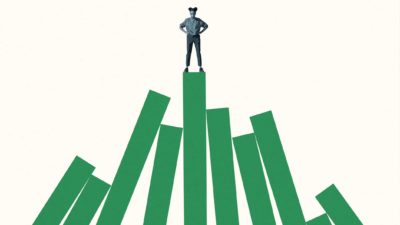The latest GDP numbers are in. It's official: Australia is in a recession after two negative quarters of GDP movement. I don't think it matters for the ASX share market.
The numbers released by Australian Bureau of Statistics (ABS) show that Australia's GDP fell by 7% in the quarter ending 30 June 2020.
That's a hefty fall. You may think that ASX would drop significantly in response to a large economic decline. Nope. The S&P/ASX 200 Index (ASX: XJO) rose by 1.8% yesterday.
Why the big rise? Well I don't think investors were euphoric about the GDP numbers, the share market just reversed the decline from the day before.
I don't think an Australian recession should mean too much for the ASX share market for a few reasons:
Timing
You have to remember how and when GDP numbers are calculated. The quarter that this decline relates to ended two months ago. We're already two thirds of the way through the quarter ending 30 September 2020.
Meanwhile, the ASX share market is forward looking. The ASX 200 took a huge 36% plunge during February and March in anticipation of the future economic hit that COVID-19 impacts would cause businesses and the country.
Many ASX shares have already strongly recovered since that share market plunge. But the recession has only just been officially recognised. Victoria is still a drag on the overall picture, but nationally things are looking much better today than in April.
Relevance
GDP gives us an insight into the overall country's economic picture. The ASX share market represents the opinion of the collective investor community about the future economic prospects of the listed businesses.
ASX shares don't completely represent the national economy. For example, plenty of small and medium private businesses are doing it tough. But, ASX share retailers are doing very well. JB Hi-Fi Limited (ASX: JBH), Harvey Norman Holdings Limited (ASX: HVN), Adairs Ltd (ASX: ADH), Temple & Webster Group Ltd (ASX: TPW) and Kogan.com Ltd (ASX: KGN) all reported impressive sales numbers.
Whilst the overall economy is important to everyone who participates in it as well as politicians, it's the performance of the individual business that matters for the share price and the dividend of a company like Wesfarmers Ltd (ASX: WES).
Expecting share prices to follow the economy's movement could mean missing out on a better performance by the ASX share market. Listed businesses are among the best of the best in the country. The strongest brands, the best balance sheets, easy access to new capital and they usually have good online operations. They're likely to be more resilient.
International growth
Australia's GDP numbers obviously are focused on Australia's economy.
But as investors we can decide to invest in a variety of businesses to get a much larger exposure to the global economy. For example, Macquarie Group Ltd (ASX: MQG) only earns a third of its profit from Australia – the other two thirds comes from places like Europe, North America and so on. That has helped Macquarie's share price rebound more than domestic banks like Westpac Banking Corp (ASX: WBC).
CSL Limited (ASX: CSL) generates a lot of earnings from the US. Sonic Healthcare Limited (ASX: SHL) generates a large amount of its earnings from the northern hemisphere. There are lots of examples. The ASX share market has plenty of global options.
Sure, there are some ASX shares like National Australia Bank Ltd (ASX: NAB) that rely on Australian economic growth for profit growth. But plenty of other ASX shares like A2 Milk Company Ltd (ASX: A2M), Cochlear Limited (ASX: COH) and Goodman Group (ASX: GMG) generate large amounts of profit offshore. They don't need a strong Australian economy to grow profit or the share price.








